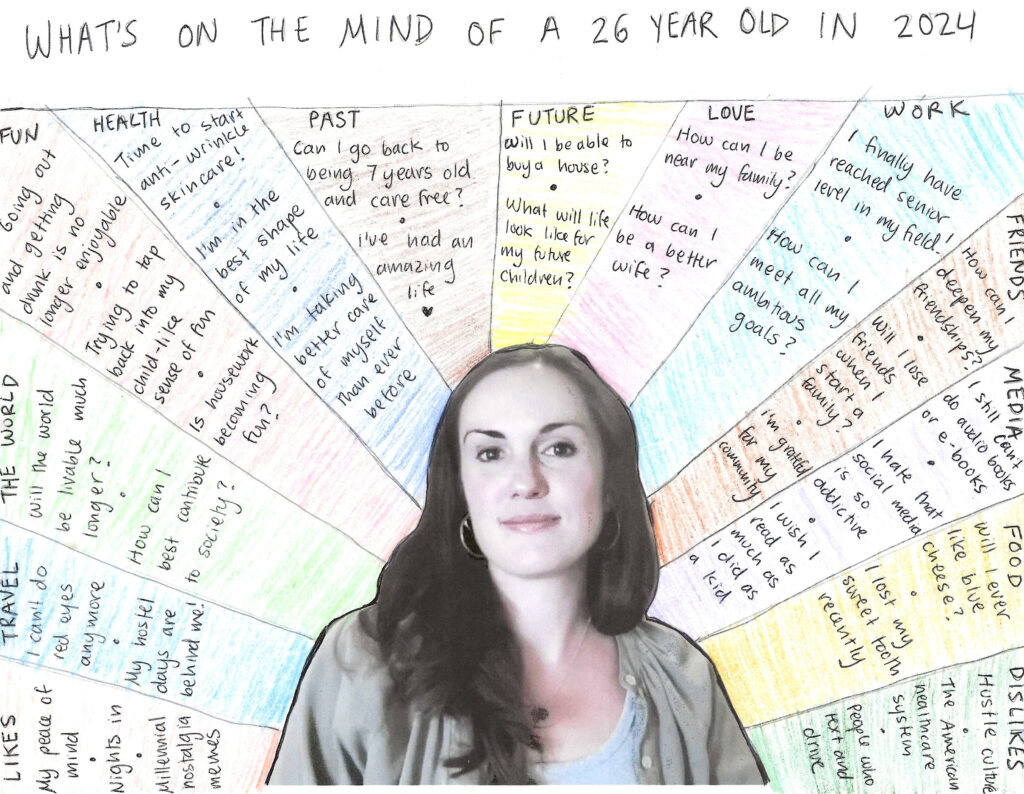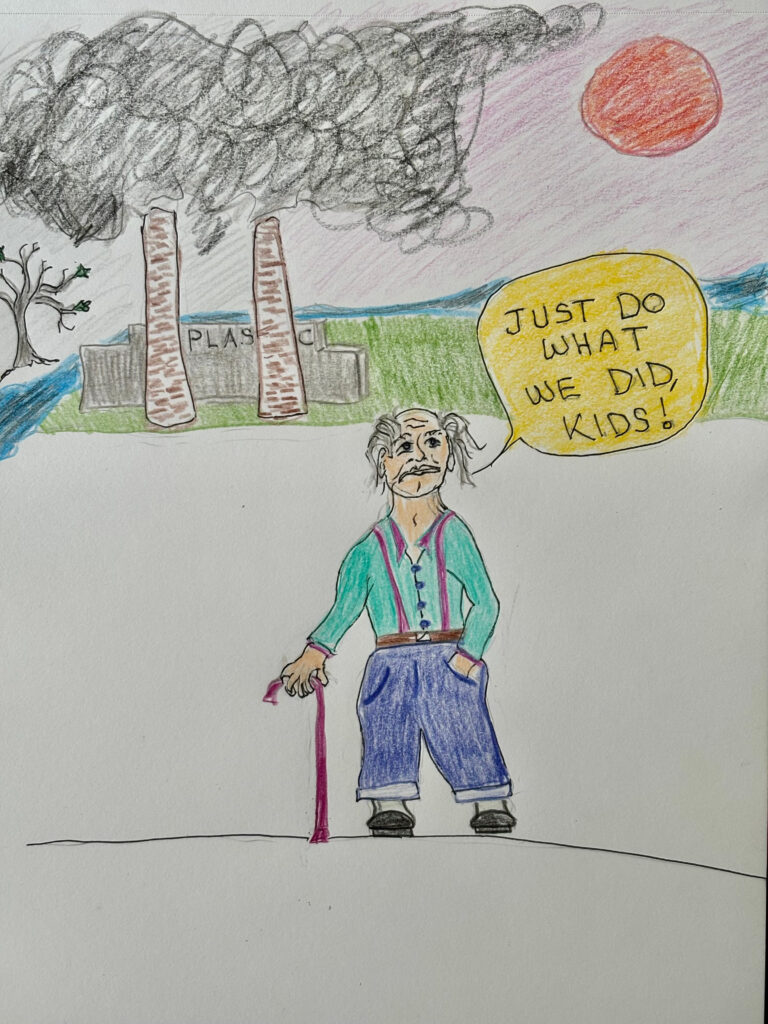Conversation starters

Roland Merullo ’71 and his daughter Zanny Merullo Steffgen ’16 bridge gender and generations in online newsletter
Just weeks shy of his 71st birthday, author Roland Merullo ’71 sits at his computer keyboard in Conway, Massachusetts, pondering an eighth decade on Earth. “There is more free time,” he types, “and there is the comfort of financial security.”
But there is also angst.
“Many days I wake up now and there’s nothing I really have to do, which can be nice … but feeling like I’m making zero contribution to the world sometimes brings on a nagging uneasiness,” Merullo writes.
Nearly 1,900 miles away in Fort Collins, Colorado, Merullo’s daughter, 26-year-old travel writer Zanny Merullo Steffgen ’16, sits at her computer, reading her dad’s words in real time on a Google Doc that they share.
“What is it like to be your age?” he asks her.
“The best part of being 26 is feeling like I have all the benefits of youth and all of the benefits of adulthood,” Steffgen types. “I’m in good physical shape and still look young enough to be ID’d at a bar.”
But, she adds, “it feels like a turning point in a lot of ways. I’m looking ahead to ‘next steps,’ like buying a home and having a family, and trying to figure out how to get there while also feeling overwhelmed with the realization that this relatively free phase of my life might be over.”
That conversation, later titled “Two Perspectives: What it’s like being 26 and 70 in 2024,” became the 24th edition of Hi Zan, Hi Pa, a newsletter Merullo and Steffgen have been co-writing since 2023. Billed as a “father-daughter conversation” that considers life, from the ordinary to the philosophical, the twice-monthly newsletters are posted to Substack, an online platform that lets writers publish directly to subscribers.
Hi Zan, Hi Pa is among hundreds of thousands of Substack publications whose writers have found an audience. For its 450 subscribers, Hi Zan, Hi Pa is a meditation, a treatise on what it is to be human and, most of all, the chronicle of a friendship.

Conversations between Zanny Merullo Steffgen ’16 and her father, Roland Merullo ’71, start with a question and go from there
A Newsletter Is Born
The newsletter was Merullo’s idea, so far as either of them can remember. It mostly came about organically, born of discontent of the soulless social media climate. “Mean-spirited, intolerant and superficial,” is the way Merullo describes it.
“We thought that we could put something into the atmosphere that’s more wholesome, thoughtful and provocative, but also respectful,” he says. “I remember a long conversation we had outside the library in Fort Collins, talking about how we might do it, how we might organize, and what we should call it.”
Steffgen describes Hi Zan, Hi Pa as a public extension of the “contemplative” conversations and emails that she and her dad have exchanged for decades. At 7 years old, Steffgen was asking Merullo to divine the meaning of life and death. “Neither of us is fond of superficial exchanges,” Merullo says.
Newsletter conversations typically flow to a weighty 2,000 words, expositions that allow them to take deep dives into what it means to be alive. Topics are limited only by their imagination. They can be whimsical but have taken plenty of sojourns into the existential: Are you happy? What does love mean to you? What is your relationship with God and spirituality?
The exchanges start slowly. Comfortably. They are a “natural conversation,” characterized by a “warming up,” Steffgen says. “And then the deeper we go, we start to tease out the different facets. By the end, the conversation is often totally different from how it started, which is fun to see. We don’t plan what we’re going to say, and we don’t have any outline. We start with a question and go from there.”

One newsletter topic was disagreement, something that doesn’t happen frequently in their relationship. They have always shown mutual respect. Commenting on their newsletter, one baffled reader asked why father and daughter are so civil.
“We tried really hard to disagree, and it was kind of funny,” Merullo says. “You can probe the depths of an important issue without disagreeing, and certainly without being disrespectful and mean-spirited.”
“The biggest differences between us are our perspectives on gender and generation,” Steffgen says. Merullo became a first-time father at 44, so their age gap is sizable.
Merullo has opinions on climate change and gender topics, but Steffgen’s counterpoint has proven enlightening. “I really try hard to be open to Zan’s points of view,” he says. “The interesting thing to me is that as well as I know Zan, these conversations enable me to see facets of her thinking that even I don’t know after all these years, and I love that.”
The Merullo household was never about rigid rules. It was, instead, a place for conversations about “how to be” in a world crying for kindness. In fact, the newsletter is a template of sorts for social decorum. Merullo says, “By nature, Zan and I think about how people behave, how we behave, how the world works, and how we wish it worked.
Growing Up Together
The newsletter and the written word were natural ways for Merullo and Steffgen to communicate. He is the author of 21 novels, including Breakfast with Buddha and A Harvest of Secrets. From Exeter, he went on to earn two degrees in Russian language and literature from Brown University, in addition to working as a cabdriver and a carpenter. He has also worked for the United States Information Agency and taught at institutions that include Amherst and Bennington colleges.
Steffgen took a less traditional route to finding her voice. In lieu of college, she moved to Cambodia at 20 and started a writing career that highlighted her experiences living abroad. She has since written for publications including Fodor’s, Scuba Diving and Adventure.com.
Merullo grew up in a lower-middle- class household outside Boston, the grandson of English and Italian immigrants. He enrolled at Exeter on a scholarship, after a woman told his mother, “You have to get him into a better school system.”
“My mother told me that when I was in my 50s,” Merullo says. Exeter was a place where it wasn’t “weird” to care about academics. The attitude was refreshing, and he was thrilled to participate in roundtable classroom conversations in which teachers encouraged discussion, disagreement and the investigation of meaty questions.
Steffgen enrolled at Exeter in her junior year, after spending two years at home because of a chronic illness. “At that point, I was just grateful to be able to go to school at all,” she says. “And I was really excited for the experience because it always sounded like my dad had a lot of independence, and I thrive on independence. I had a wonderful Exeter experience.”
She says Exeter’s Harkness approach, and its focus on courage, compassion and empathy, is integral to the person she is today. They’re characteristics that can be found in Hi Zan, Hi Pa.
A Broader Purpose
While the national discourse is fractured along political and cultural fault lines, the newsletter offers a kinder and gentler alternative.
“Hi Zan, Hi Pa impressively aspires to restore dialogue in the age of monologue, the experience of speaking with someone rather than past someone, an experience with which we’ve dangerously lost touch as a culture and a society,” says Robert Braile, a longtime friend of the Merullo family and former environmental correspondent and book critic for The Boston Globe. Braile is the husband of Exeter Mathematics Instructor Dale Braile and father of Assistant Director of Admissions Alex Braile.
“Conversation is the heart and soul of a society,” Merullo says. “If you can’t have open, forthright, respectful conversations, the society falls apart, I think. I don’t know that we’re modeling that for the entire nation, but we’re putting our little piece out there and saying, look, this is how you can talk to somebody. And I’m proud of that and it matters to me that we do that.”
Braile adds, “That the exchange between Roland and Zanny crosses genders and generations makes it even more integral to resurrecting thoughtful and civil discourse in our country: a common language to sustain our common humanity.”
The newsletters resonate in still other ways.
“I love that their columns are about everyday situations I’m experiencing and thinking about,” says longtime English Instructor Lundy Smith, who was an adviser to Steffgen and her sister, Juliana ’19, when both lived in Langdell Hall. “Roland and Zanny are kind of the ‘Seinfeld’ of the Substack world. One of the things I love about all of the Merullos is that they welcome debate and don’t shy away from controversy. Zanny and Roland model the skills we all need to navigate our divisive society.”


A few graphics from the Hi Zan, Hi Pa newsletter
While they have avoided being overtly political, Merullo acknowledges that the political headwinds are getting harder to ignore. “In a politically divided nation, conversation is curative,” he says. Perhaps not so much more than in communicating with his daughter Zanny.
“We’re exposing our relationship to people that we don’t know,” Merullo says. “We get very personal. We’re not afraid to show who we are. We’re not afraid to talk about difficulties we’ve had in the past especially, but even now. And I think that too sets it a little bit apart from some of the stuff online.”
Readers can expect the unexpected. Some recent newsletter topics include their relationship with money. A July installment highlighted father’s and daughter’s struggles with directions. “We get lost really easily,” Steffgen says. “It’s something we’re able to joke about.”
Steffgen, who posts “discussion questions” at the end of each newsletter, is calculated in her outreach. “Being vulnerable gives our readers permission to be vulnerable too,” she says. “We’ve had some really good discussions with our readers that way.”
Merullo and Steffgen are on to something. In a world of limited attention spans and limitless entertainment options, 90% of Hi Zan, Hi Pa subscribers renewed their annual memberships. The secret to success, Merullo and Steffgen say, stems from mutual respect, as evidenced by an early pact.
“I said to Zan, ‘If you get to be 18 and you never say, “Dad, you ruined my life,” I’ll give you a hundred bucks,’” Merullo says. “When she got to be 18, she said, ‘You owe me a hundred bucks.’ And I paid up.”
Andrew Faught is a freelance writer in Fresno, California. He has written widely on the issues and ideas of education.
This article was first published in the winter 2025 edition of The Exeter Bulletin.